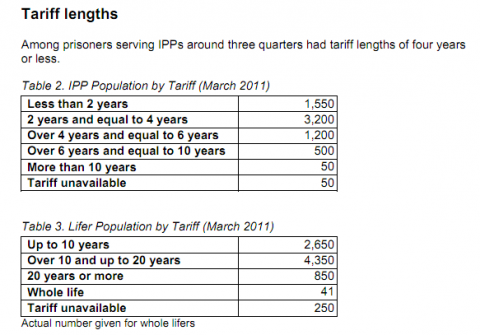Are there more life sentence prisoners in the UK than in the rest of Europe combined?
"We in this country have more life sentence prisoners than all of the other countries in the council of Europe added together"
Frances Cook, Chief executive of the Howard League for Penal Reform,Today Programme 27 October 2011
Ken Clarke's proposal to impose a mandatory life sentence for those offenders who have twice committed a serious violent crime have met with some opposition.
Stories about the overcrowded state of prisons in this country have become quite commonplace, but can the UK really be as prolific with its handing out of life sentences as the head of Howard League claims?Analysis
It is certainly a striking claim. 47 countries are members of the Council of Europe. The Howard League's claim would mean that the life sentence prisoner population in the UK is at least 46 times that of the average life sentence prisoner population in these other European countries.
Full Fact contacted the Howard League to ask for their source. They pointed us towards the Council of Europe Annual Penal Statistics; the latest CoE report on this matter, based on a 2009 survey of the CoE countries.
On page 71, a breakdown of each country's prison population by length of sentence is provided. England and Wales are recorded as having a life sentence prisoner population of 12,521, Northern Ireland as having 175, and Scotland as having 762. The rest of the European countries have a combined total of 8,027. These Council of Europe figures therefore back up the Howard league claim.
A note of caution is introduced when we look at the "general remarks" beneath the table. We are told:
"Some countries could have included persons sentenced to security measures (mentally ill offenders and persons considered as dangerous) under the category "life imprisonment" because in such cases the length of detention/imprisonment is not fixed. However, as a rule, such persons have been excluded from the distribution, and counted separately (see notes to Table 8)"
When Full Fact examined the explanatory notes for the UK date, however, it found no mention of prisoners for which "the length of detention/imprisonment is not fixed".
Such sentences do exist in England and Wales (indeed, Ken Clarke's latest proposals include scrapping them), so Full Fact decided to look for Ministry of Justice (MoJ) statistics regarding both these unfixed sentences and life sentences.
An MoJ summary states that, as of 31 March 2008, there were "10,911 prisoners serving an indeterminate sentence (life imprisonment or Imprisonment for Public Protection)". 4,170 of these "are sentenced to an indeterminate sentence of Imprisonment (or Detention) for Public Protection".
A more recent MoJ document reported that, as of the end of March 2011, there were 14,650 prisoners in England and Wales serving indefinite sentences. 6,550 of these were serving an "Imprisonment for Public Protection" (IPP) sentence.
Because they cover different time periods to the CoE figures solid comparisons cannot be made. However the figures do highlight the impact that including those serving IPPs in the figures could have. We have contacted the Council of Europe to establish some certainty on this point.
This need not discredit the CoE results. The MoJ themselves have referred to those given IPP sentences as life sentence prisoners. For example in the report, "Life Sentence/Imprisonment for Public Protection — An Overview", it says:
The potential problem of combining these two types of sentences together is illustrated in the two tables below."For the purposes of this Manual the term "life sentence prisoner" includes those offenders sentenced to Imprisonment (or Detention) for Public Protection (IPP) unless specifically stated otherwise"

As can be seen, the length of tariff (the amount of time that must be served before the prisoner is considered for release) generally given to those serving life sentences is considerably longer than for those serving IPPs. It should be noted that the length of tariff does not equate to the length of the sentence actually served, as 3,500 of the 6,500 currently serving IPPs have served longer than the length of their tariff. Nonetheless, the difference in the length of tariff is indicative of a difference in the length of sentence served for the two groups.
Conclusion
The possibility that IPPs are included in the figures could challenge the exact formulation of the claim, and we are trying to get clarity from the Council of Europe on this issue.Even if we disregard IPP sentences, it is clear that "life sentences" in the UK are imposed to a far greater extent than in other Council of Europe countries.
Update (07/11/2011): A Council of Europe representative has confirmed that they include those given IPP sentences in their measure of the number of prisoners given "life sentences" in the UK.
Update (22/02/2012): A reader contacted us to emphasise the importance of including IPP figures in the term "life sentences". He pointed to an article on a recent German Constitutional Court ruling that prolonged detention was unconstitutional, and suggesting that there were between 7,000 and 10,000 prisoners affected by the ruling.
Whilst this figure may not necessarily reflect the number of prisoners serving prolonged sentences (as some may be being considered for prolonged sentences) it is important to note that the figure for Germany provided by the Council of Europe is unlikely to contain the number of prisoners serving prolonged sentences.
A more accurate estimate might be to subtract the number of prisoners serving IPPs in the UK from the CoE figure, although this would involve using figures from different dates. The March 2011 figures state that 8,100 prisoners are currently serving life sentences, excluding those on IPPs.
Whilst this is more than any other country, it is not necessarily true to say that this is more than all other countries in the Council of Europe put together. The 2009 survey gives a figure of 8,964 for other countries, although it is unclear how many of these countries include other indeterminate sentences in their figures.